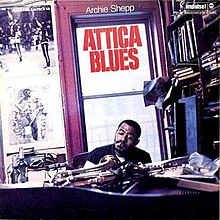Attica Blues (album)
Appearance
| Attica Blues | ||||
|---|---|---|---|---|
 | ||||
| Studio album by | ||||
| Released | 1972 | |||
| Recorded | January 24–26, 1972 | |||
| Studio | A&R Recording, New York | |||
| Genre | Jazz, post-bop, avant-garde jazz, big band, jazz poetry, funk | |||
| Label | Impulse! AS-9222 | |||
| Producer | Ed Michel | |||
| Archie Shepp chronology | ||||
| ||||
| Review scores | |
|---|---|
| Source | Rating |
| Allmusic | |
| Rolling Stone | favorable[2] |
| The Rolling Stone Jazz Record Guide | |
| The Penguin Guide to Jazz Recordings | |
| Pitchfork | 9.3/10[5] |
Attica Blues is an album by avant-garde jazz saxophonist Archie Shepp. Originally released in 1972 on the Impulse! label, the album title refers to the Attica Prison riots.[6]
Reception
The AllMusic review by Steve Huey states: "Attica Blues is one of Shepp's most successful large-group projects, because his skillful handling of so many different styles of black music produces such tremendously groovy results".[7] Stephen Davis of Rolling Stone said that it was "not just a masterpiece of protest: [...] it is more a politico/religious experience, an appeal to higher human consciousness to, for God's sake, help us out of this torment."[2]
Track listing
- All compositions by Archie Shepp, except as indicated
- "Attica Blues" (lyrics by Beaver Harris) – 4:49
- "Invocation: Attica Blues" (Harris) – 0:18
- "Steam, Part 1" – 5:08
- "Invocation to Mr. Parker" (lyrics by Bart Gray) – 3:17
- "Steam, Part 2" – 5:10
- "Blues for Brother George Jackson" – 4:00
- "Invocation: Ballad for a Child" (Harris) – 0:30
- "Ballad for a Child" (lyrics by Harris) – 3:37
- "Good-Bye Sweet Pops" (Cal Massey) – 4:23
- "Quiet Dawn" (Massey) – 6:12
- Recorded at A&R Recording, NYC, January 24–26, 1972 (Track timings slightly differ from one issue to another, due to merging tracks.)
Personnel
- Archie Shepp - tenor saxophone (1, 6, 8, 10) and soprano saxophone (3, 5, 9)
- Brass and reed section on tracks 1, 6, 9 and 10
- Clifford Thornton - cornet
- Roy Burrows, Charles McGhee, Michael Ridley - trumpet
- Charles Greenlee, Charles Stephens, Kiane Zawadi - trombone
- Hakim Jami - euphonium
- Clarence White - alto saxophone
- Roland Alexander, Billy Robinson - tenor saxophone
- James Ware - baritone saxophone
- String section on tracks 1, 3, 5, and 8—10
- Marion Brown - alto saxophone (1, 6), bamboo flute (3), flute (4), percussion (3—5)
- Walter Davis, Jr. - electric piano (1, 6), piano (6, 8—10)
- Dave Burrell - electric piano (3, 5)
- Cornell Dupree - guitar (1, 3, 5, 8)
- Roland Wilson (1, 3, 5–6, 8), Gerald Jemmott (1) - Fender bass
- Jimmy Garrison - bass (3—5, 9, 10)
- Beaver Harris (1, 3, 5–6, 8) - drums
- Ollie Anderson, Nene DeFense, Juma Sultan - percussion (1, 6, 10)
- Vocals
- Henry Hull (1, 8), Joe Lee Wilson (3, 5) - vocals
- William Kunstler (2, 7), Bartholomew Gray (4) - narrator
- Joshie Armstead, Albertine Robertson - backing vocals (1)
- Featured exclusively on tracks 9 and 10, written by Cal Massey
- Romulus Franceschini - conductor and co-arranger
- Cal Massey - fluegelhorn (10)
- Waheeda Massey - vocals (10)
- Billy Higgins - drums
References
- ^ Allmusic review
- ^ a b Davis, Stephen (August 17, 1972). "Archie Shepp - Attica Blues". Rolling Stone. No. 115. Retrieved 12 January 2016.
- ^ Swenson, J., ed. (1985). The Rolling Stone Jazz Record Guide. USA: Random House/Rolling Stone. pp. 179. ISBN 0-394-72643-X.
- ^ Cook, Richard; Morton, Brian (2008). The Penguin Guide to Jazz Recordings (9th ed.). Penguin. p. 1290. ISBN 978-0-141-03401-0.
- ^ Chinen, Nate. "Archie Shepp: Attica Blues Album Review". Pitchfork. Retrieved April 17, 2022.
- ^ Bergstrom, John (1 April 2014). "Archie Shepp / Attica Blues Orchestra - I Hear the Sound". PopMatters. Retrieved 12 January 2016.
- ^ Huey, S. Allmusic Review, accessed June 25, 2009.
